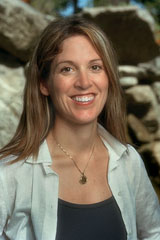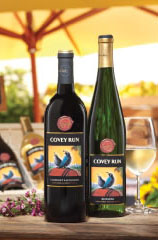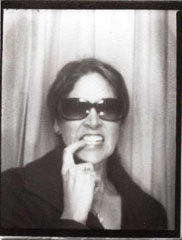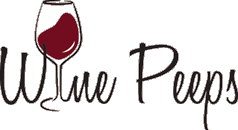Women of Washington Wine: Kate Michaud of Covey Run
By Kori ~ January 31st, 2011.
Today’s post is part of a series featuring the Women of Washington Wine. In an industry once dominated by men, more and more women are joining the ranks as winery owners, vineyard owners, and winemakers. Being a woman myself, I am fascinated by these women and what they have done and continue to do. Through this series, I hope to introduce you to some of the brightest female faces in the Washington wine industry.
 Kate Michaud, the daughter of American ex-pats, was raised in the United Kingdom and travelled throughout Europe while growing up. As a result, she was exposed to wine at a tender age. Kate graduated with a degree in Art History from the University of Oregon before venturing into the wine industry. Bonny Doon Vineyards in Santa Cruz, California, gave Kate her first job in the industry. Since then, Kate has worked in wineries in California and Washington as well as spent time in Australia and New Zealand during harvest in the Southern Hemisphere. She completed the UC Davis Winemaking Certificate Program in 2005 and accepted her current position as winemaker at Covey Run in 2007.
Kate Michaud, the daughter of American ex-pats, was raised in the United Kingdom and travelled throughout Europe while growing up. As a result, she was exposed to wine at a tender age. Kate graduated with a degree in Art History from the University of Oregon before venturing into the wine industry. Bonny Doon Vineyards in Santa Cruz, California, gave Kate her first job in the industry. Since then, Kate has worked in wineries in California and Washington as well as spent time in Australia and New Zealand during harvest in the Southern Hemisphere. She completed the UC Davis Winemaking Certificate Program in 2005 and accepted her current position as winemaker at Covey Run in 2007.
I had the pleasure to meet Kate during the Wine Press Northwest Platinum Judging in November. Recently, she was kind enough to take time out of her busy schedule to answer some questions for me and our Wine Peeps readers.
Highlights from Q&A with Kate Michaud:
How did you first get involved in the wine business?
I had been a ski bum for a while, but those years had run their course and I was looking to move on. In my skiing years, I realized I really enjoyed the manual labor I did to earn a ski pass, and I wanted a working life that had the same physicality and tangible results. Working in a winery fit that bill, plus it was slightly more glamorous as it involved wine. At the time, I shared custody of a pit bull, named Alice, with my ex-boyfriend who lived in California. I went to drop off Alice at his place and found myself working in a winery. Had he lived in Arkansas, my life might have taken a different route.
What were the steps that led to where you are now?
My first job was working in the tasting room at Bonny Doon Vineyards. I moved to production as soon as an opportunity opened up, which was in data entry for their wine tracking system. Data entry for Bonny Doon didn’t consume my day, so I would spend the rest of my hours collecting samples for the lab or hanging out in the lab learning to run a free SO2. Or, I was given a task: stir these 300 barrels or clean this tank. I happened to tour a winemaker from Western Australia around our site and then asked if he perhaps needed some labor at harvest. He did, and I was hired to be the Harvest Enologist although I had spotty lab experience. Shortly after returning to Bonny Doon from a harvest abroad, I followed an ex-Dooner to David Bruce Winery where I was the assistant enologist. The cost of living in California seemed to crush any dreams of owning a home so I moved up to Washington where I got a job at Canoe Ridge as Enologist and was promoted to Assistant Winemaker after a few years. From there I was offered my current job, which was a great opportunity to grow. I haven’t looked back. It’s been great so far.
 Has being a woman been an advantage or a disadvantage in your wine journey?
Has being a woman been an advantage or a disadvantage in your wine journey?
I would say it has been an advantage. At the entry level, there is proving ground stuff going on. There is an expectation that cellar work is mostly a man’s job, so if you are that woman who holds her own, you are celebrated. For example, a guy who cleans the press every night at 2am is still just doing his job, but the expectation for the “girl†would be for that she’ll decide after doing it once she would rather work in a warm lab. If you are that girl who’s cleaning the press at 2am every night, you become something of a celebrated oddity, and therefore you have an advantage. When you reach a higher level, it becomes a point of distinction in the job market.
What advice do you have for a woman wanting to get involved in the wine business today?
Find a great mentor. Ask thoughtful questions. Challenge. Learn everything. Take a job based on a wide purview, or a job that has a tiny exposure to something that will get drilled into your head over and over again. It is okay that it takes time to move up; this leads to a richer payoff (though, maybe not literally). Your feet will be wet, you might drop a barrel off wet forks or make some bad decisions along the way, but you learn from them. Move around, especially early when you are expendable, then maybe decide you want to specialize in Pinot Noir or an area where you start to build something.
I understand that you have worked harvest in Australia and New Zealand in addition to your work at wineries in Washington and California. What have you learned from those experiences?
That there are a lot of ways to skin a cat. The exposure to unfamiliar yeasts, fermentation aids and fining agents or equipment seems equally important to the winemaker’s approach, but the danger is to think all of the information is valid wherever you go. That took me a while to learn. The picture is more complicated than that. Of course, you need to take into account all the particulars like climate, etc., but working harvest generally takes three months, so you don’t really get the whole picture. You get most of it and those experiences are invaluable, but you still have to fill in some blanks.
 What are your thoughts about the Washington wine industry, in general?
What are your thoughts about the Washington wine industry, in general?
We have a great opportunity that we aren’t quite capitalizing on. We have great resources for grapes that keep getting better as our growers become more and more vested in growing vinifera and our collective knowledge advances. Winemakers are honing their skills by trial and error, but we haven’t quite hit on the right note to market Washington wine beyond the Pacific Northwest to the rest of the world. We know we are a great value and have great wine but don’t have that singular message.
In recent years the Washington wine industry has grown at a rapid rate. Do you expect that trend to continue?
Not sure. I left California when housing at $200,000 for a shack seemed crazy. That wasn’t the peak, not even close. It seems easy to say that there was a bandwagon that everyone jumped on and that in this economy there will be some shake out. I am sure there will be some wineries that cannot survive at the higher price points, but I am not sure we hit our peak before the economy turned.
What is your vision for the future of Covey Run?
World domination. Quickly. I would like to see Covey embraced by critics who lead with price point and aren’t colored by it. I would like to have fun doing it…to make great wine without all the fuss.
—
Many thanks to Kate for sharing her story and thoughts with us. I wish her all the best and will continue following her work and Covey Run with great interest, and I hope that you will too.
(Photos from Covey Run)
Filed under: American Wine, Interview, Washington State Wine, Women of Washington Wine

 Wine Peeps is an independent wine blog dedicated to helping you get the most bang for your buck in wine. We do this through blind tastings of wine from around the world and calculations of
Wine Peeps is an independent wine blog dedicated to helping you get the most bang for your buck in wine. We do this through blind tastings of wine from around the world and calculations of 











I agree on your thoughts about the Washington Wine Industry. I just returned from 2 wks. in New Zealand, now there is a place that has knows how to market to the world! We have to figure that out here. Love what you do at Covey Run, keep up the great work!
Kate, keep up the good work. We enjoy your wines frequently and appreciate that kind of affordable quality.